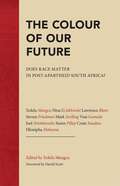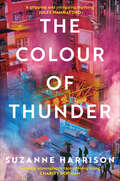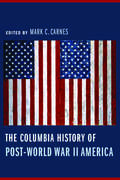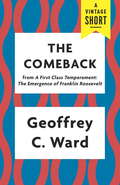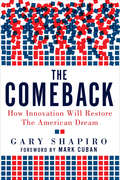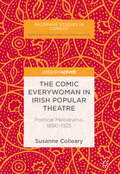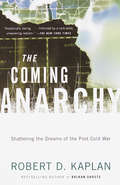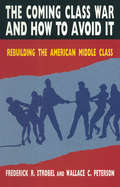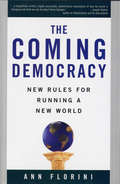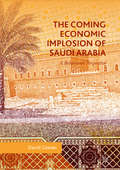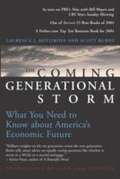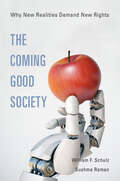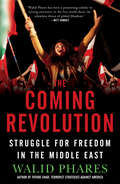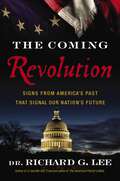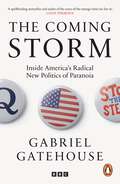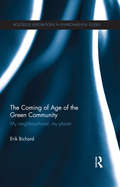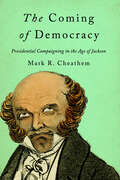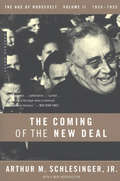- Table View
- List View
The Colour of Our Future: Does race matter in post-apartheid South Africa?
by Xolela MangcuSouth Africa is ready for a new vocabulary than can form the basis for a national consciousness which recognises racialised identities while affirming that, as human beings, we are much more than our racial, sexual, class, religious or national identities.The Colour of Our Future makes a bold and ambitious contribution to the discourse on race. It addresses the tension between the promise of a post-racial society and the persistence of racialised identities in South Africa, which has historically played itself out in debates between the ‘I don’t see race’ of non-racialism and the ‘I’m proud to be black’ of black consciousness. The chapters in this volume highlight the need for a race-transcendent vision that moves beyond ‘the festival of negatives’ embodied in concepts such as non-racialism, non-sexism, anti-colonialism and anti-apartheid. Steve Biko’s notion of a ‘joint culture’ is the scaffold on which this vision rests; it recognises that a race-transcendent society can only be built by acknowledging the constituent elements of South Africa’s EuroAfricanAsian heritage.The distinguished authors in this volume have, over the past two decades, used the democratic space to insert into the public domain new conversations around the intersections of race and the economy, race and the state, race and the environment, race and ethnic difference, and race and higher education. Presented here is some of their most trenchant and yet still evolving thinking.
The Colour of Thunder: Intertwining Paths And A Hunt For Truth In Hong Kong
by Suzanne HarrisonOne small island, six troubled residents hunt for the truth before the storm arrives.Johnny is a powerful and successful businessman and is finally considering settling down with elusive new arrival Scarlett. However, there are whispered rumours about possible past involvement in corruption and even kidnap with his violent business partner. And the repercussions of these events are still impacting the Island’s residents.It is said many people move to Hong Kong to make a break from their past. In one of the world’s most vibrant international cities, a number of paths intertwine in the hunt for the truth as the storm of the century approaches.‘I thoroughly enjoyed reading this gripping and intriguing mystery… Not only is the story full of deep secrets and provocative characters but it also captures the many compelling and diverse facets of Hong Kong in the narrative. This captivating and dynamic book is a must for anyone who enjoys a stormy atmospheric ride set in a city rich in culture and intrigue.’ Jules Hannaford, author of Fool Me Twice, Podcaster of Hong Kong Confidential'I was utterly immersed in this complex, intriguing, vividly atmospheric tale of Hong Kong.' Charity Norman'Gripping... a sinuous mystery juggl[ing] murder, kidnapping, child trafficking, corrupt policing, assault, arson and political oppression' South China Morning Post
The Columbia Guide to America in the 1960s
by Beth Bailey David FarberThe 1960s continue to be the subject of passionate debate and political controversy, a touchstone in struggles over the meaning of the American past and the direction of the American future. Amid the polemics and the myths, making sense of the Sixties and its legacies presents a challenge. This book is for all those who want to take it on. Because there are so many facets to this unique and transformative era, this volume offers multiple approaches and perspectives. The first section gives a lively narrative overview of the decade's major policies, events, and cultural changes. The second presents ten original interpretative essays from prominent historians about significant and controversial issues from the Vietnam War to the sexual revolution, followed by a concise encyclopedia articles organized alphabetically. This section could stand as a reference work in itself and serves to supplement the narrative. Subsequent sections include short topical essays, special subjects, a brief chronology, and finally an extensive annotated bibliography with ample information on books, films, and electronic resources for further exploration. With interesting facts, statistics, and comparisons presented in almanac style as well as the expertise of prominent scholars, The Columbia Guide to America in the 1960s is the most complete guide to an enduringly fascinating era.
The Columbia History of Post-World War II America
by Ed. Carnes Mark CBeginning with an analysis of cultural themes and ending with a discussion of evolving and expanding political and corporate institutions, The Columbia History of Post-World War II America addresses changes in America's response to the outside world; the merging of psychological states and social patterns in memorial culture, scandal culture, and consumer culture; the intersection of social practices and governmental policies; the effect of technological change on society and politics; and the intersection of changing belief systems and technological development, among other issues.Many had feared that Orwellian institutions would crush the individual in the postwar era, but a major theme of this book is the persistence of individuality and diversity. Trends toward institutional bigness and standardization have coexisted with and sometimes have given rise to a countervailing pattern of individualized expression and consumption. Today Americans are exposed to more kinds of images and music, choose from an infinite variety of products, and have a wide range of options in terms of social and sexual arrangements. In short, they enjoy more ways to express their individuality despite the ascendancy of immense global corporations, and this volume imaginatively explores every facet of this unique American experience.
The Comeback
by Geoffrey C. WardAn eBook short.Franklin Roosevelt contracted polio in the summer of 1921, resulting in permanent paralysis from the waist down. One year later, he went back to work. Noted historian Geoffrey C. Ward, winner of the National Book Critics Circle Award and the Parkman Prize and finalist for the Pulitzer Prize, who is himself a polio survivor, investigates the courage and character of the man who became the greatest president of the twentieth century. "The Comeback," a selection from A First-Class Temperament, the second volume in Ward's monumental biography that began with Before the Trumpet, is the story of one extraordinary man's struggle to regain his feet and reenter public life. Before his illness, FDR's political future had seemed bright. He knew that pity was poison, that if the public understood the extent of his disability his career would be at an end. Roosevelt, therefore, had to teach himself the impossible: how to walk--or seem to walk--again. This is that journey, following the future president from his disastrous attempt to return to his law office to his triumphant march down the aisle at the 1924 Democratic National Convention, where, leaning on his crutches, he delivered the triumphant "Happy Warrior" speech for ill-fated presidential candidate Al Smith and was hailed as a hero. It was FDR's new beginning.
The Comeback: How Innovation Will Restore the American Dream
by Mark Cuban Gary ShapiroAmerica seems to be on a downward slide. Our government spends too much; our economy creates too little; and we aren't preparing our children to compete in a global marketplace. Yet our politicians - Republican and Democrat alike - just don't get it. While once-great cities fall into decay, Washington thrives, living off the hard work and tax dollars of the private sector. It's time for an American comeback -- and it starts with innovation. Throughout its history, America's great innovators have been the drivers of our unsurpassed economic success. American innovation transformed a country of ragtag farmers into the epicenter of the world's technological progress. Innovation creates jobs, markets, and new industries where none existed before. Most importantly, innovation moves us forward as a nation, pushing us to succeed and strive for a better tomorrow. In short, innovation is the American Dream.In The Comeback, Gary Shapiro shows us how to return innovation to its rightful place at the center of America's economic policy. The Comeback is a new blueprint for America's success.
The Comic Everywoman in Irish Popular Theatre: Political Melodrama, 1890-1925 (Palgrave Studies in Comedy)
by Susanne CollearyThis book is a comprehensive study of comic women in performance as Irish Political Melodrama from 1890 to 1925. It maps out the performance contexts of the period, such as Irish “poor” theatre both reflecting and complicating narratives of Irish Identity under British Rule. The study investigates the melodramatic aesthetic within these contexts and goes on to analyse a selection of the melodramas by the playwrights J.W. Whitbread and P.J. Bourke. In doing so, the analyses makes plain the comic structures and intent that work across both character and action, foregrounding comic women at the centre of the discussion. Finally, the book applies a “practice as research” dimension to the study. Working through a series of workshops, rehearsals and a final performance, Colleary investigates comic identity and female performance through a feminist revisionist lens. She ultimately argues that the formulation of the Comic Everywoman as staged “Comic” identity can connect beyond the theatre to her “Everyday” self. This book is intended for those interested in theatre histories, comic women and in popular performance.
The Coming Anarchy
by Robert D. KaplanFrom the bestselling author of Balkan Ghosts and The Ends of the Earth comes a fascinating new book on the imminent global chaos that is as brilliant as it is necessary, as original as it is controversial.The end of the Cold War has not ushered in the global peace and prosperity that many had anticipated. Environmental degradation is causing the rampant spread of famine and disease, and a rising number of nations are being torn by violent wars of fierce tribalism and trenchant regionalism. Our newest democracies, such as Russia and Venezuela, are bloody maelstroms of violence and crime, while America is beset with an alarmingly high number of apathetic citizens content to concern themselves with matters of entertainment and convenience. Bold, erudite, and profoundly important, The Coming Anarchy is a compelling must-read by one of today's most penetrating writers and provocative minds."Analytically daring.... Informed by a rock-solid, unwavering realism and an utter absence of sentimentality.... Kaplan is a knowledgeable and forceful polemicist who mixes the attributes of journalist and visionary." --The New York Times"Ambitiously eclectic.... [Kaplan] is one of America's most engaging writers on contemporary international affairs." --The New York Times Book ReviewFrom the Trade Paperback edition.
The Coming Class War and How to Avoid it: Rebuilding the American Middle Class
by Christoph Strobel Paul E PetersonA clear, accessible analysis of the worsening distribution of income and wealth in America.
The Coming Democracy: New Rules For Running A New World
by Ann FloriniNational governments are proving ill-equipped to manage an increasingly complicated suite of global problems, from infectious diseases to climate change to conflicts over international trade. In The Coming Democracy, leading political analyst Ann Florini sets forth a compelling new paradigm for transnational governance, one based on the concept of "transparency"-- the idea that the free flow of information (on topics ranging from corporate and government behavior to nuclear proliferation to biodiversity protection) provides powerful ways to hold decision makers accountable and to give ordinary people meaningful voice in shaping the policies that affect them. Dramatic breakthroughs in information technology of the past decade have made such transparency possible on a global scale.Florini offers a clear and comprehensive assessment of the possibilities for using transparency to develop effective approaches to transnational governance. She shows how this new form of governance promises real hope for managing global problems, and provides a compelling scenario that demonstrates how existing conventions and institutions can lead the way in the evolution of a better system of global governance.
The Coming Economic Implosion of Saudi Arabia: A Behavioural Perspective
by David CowanThe kingdom of Saudi Arabia is at a crossroads economically, and faces the challenge of a weakening economy that could implode before 2030, the year set as a timetable by the kingdom in its Vision 2030. How it navigates its way out of these economic troubles demands understanding a complex of religious, political and economic factors, which currently makes it one of the most unpredictable states in the world and, by the same token, one of the most fascinating. The problem of the Saudi economy cannot simply be argued economically, it needs political and religious solutions as well. Cowan takes a behavioural approach to analysing the Saudi economy. Predicting an implosion under the weight of its own ideologically-fuelled economy if it does not reset its agenda, this interdisciplinary book provides important insights into Saudi Arabia's position in the Islamic world and global economy.
The Coming Generational Storm: What You Need to Know About America's Economic Future
by Laurence J. Kotlikoff Scott BurnsThe Coming Generational Storm has been revised and updated and includes a new foreword by the authors. In 2030, as 77 million baby boomers hobble into old age, walkers will outnumber strollers.
The Coming Good Society: Why New Realities Demand New Rights
by William F. Schulz Sushma Ramen&“Challenge[s] all of us to think deeply about what kind of society we and our children and our children&’s children will want to live in.&” (Margaret L. Huang, former Executive Director, Amnesty International USA) A rights revolution is under way. Today the range of nonhuman entities thought to deserve rights is exploding. Changes in norms and circumstances require the expansion of rights: What new rights, for example, are needed if we understand gender to be nonbinary? Does living in a corrupt state violate our rights? When biotechnology is used to change genetic code, whose rights might be violated? What rights, if any, protect our privacy from the intrusions of sophisticated surveillance techniques? Drawing on their vast experience as human rights advocates, William Schulz and Sushma Raman challenge us to think hard about how rights evolve with changing circumstances, and what rights will look like ten, twenty, or fifty years from now. The Coming Good Society details the many frontiers of rights today and the debates surrounding them. Schulz and Raman equip us with the tools to engage the present and future of rights so that we understand their importance and know where we stand. &“Thoughtful and provocative.&” —Human Rights Quarterly &“[A] trail-blazing map through the new frontiers of rights . . . downright riveting.&” —Gloucester Times &“An accessible primer for anyone who wishes to understand the current limitations in our notions of rights and the future challenges for which we must prepare.&” —Kerry Kennedy, President, Robert F. Kennedy Human Rights &“Schulz and Raman outline brilliantly where [human rights] growth may take rights in the generations to come.&” ―Zeid Ra&’ad al-Hussein, former United Nations High Commissioner for Human Rights
The Coming Revolution
by PharesAfter the 9/11 Commission concluded in 2004 that the U.S. was engaged in a war with terrorists and never realized it, they reasoned that "a failure of imagination" had prevented us from seeing terrorism coming. In effect, Americans were simply unable, or in fact disabled, to fathom that there were people who hated and opposed our democracy with such ferocity. But after billions of dollars and almost a decade fighting a war in the Middle East, will we miss the threat again? With penetrating insight and candor, Walid Phares, Fox News terrorism and Middle East expert and a specialist in global strategies, argues that a fierce race for control of the Middle East is on, and the world's future may depend on the outcome. Yet not a failure of imagination, but rather, of education has left Americans without essential information on the real roots of the rising Jihadi threat. Western democracies display a dangerous misunderstanding of precisely who opposes democracy and why. In fact, the West ignores the wide and disparate forces within the Muslim world--including a brotherhood against democracy that is fighting to bring the region under totalitarian control--and crucially underestimates the determined generation of youth feverishly waging a grassroots revolution toward democracy and human rights. As terror strikes widen from Manhattan to Mumbai and battlefields rage from Afghanistan to Iraq, many tough questions are left unanswered, or even explored: Where are the anti-Jihadists and the democrats in the Muslim world? Does the Middle East really reject democracy? Do the peoples of the region prefer the Taliban, the Muslim Brotherhood, or Hezbollah over liberals and seculars? And is there really no genuine hope that freedom and democracy can prevail over the Islamist caliphate? Phares explores how the free world can indeed win the conflict with the Jihadists, but he says, not by using the tactics, policies, and strategies it has employed so far. He urges policy makers to first identify the threat and define its ideology, or there will be no victory. The Coming Revolution is a vital corrective step in the world's war against terrorism and essential reading that clearly and explosively illustrates the untold story of a struggle to determine if the Middle East can at last reach freedom in this century--or if this planet can prevent the otherwise inevitable outcome that could change our social and political landscape forever. The race is on.
The Coming Revolution: Signs from America's Past That Signal Our Nation's Future
by Richard LeePeople need a creed and a cause, and today millions of patriotic Americans are finding their voices.They say the best indicator of the future is history. How things have been can be a powerful signal of how they will be. But what will be our role in shaping the future for this country?In The Coming Revolution Dr Richard G. Lee powerfully explains that a new revolution is coming. It may be in the streets of our nation's capitol--as we saw in Europe last year--or, better yet, in voting booths across America. Signs from our nation's past and present ring out the truth: a second American revolution is near at hand.Using this country's rich heritage of liberty and democracy as a roadmap toward where we could be headed, Dr. Lee brings thoughtful clarity to the ever-growing probability of such a revolution in America; illuminating the important reminder that the voices of every revolution have been--and always will be--the ordinary everyman.Discover how you can be a part of this country's social, political, and moral reform and how faith in God serves as the one truth that can provide both individual and national guidance for America's next revolution."A powerful reminder about why America is great and worth fighting for."--Lt. Colonel Oliver L. North, USMC (Ret.)"Within this book Dr. Richard Lee clearly reveals how the intolerable conditions being forced upon the American people by Washington's current administration will lead to a certain and powerful explosion of predictable consequences."--Michael Reagan
The Coming Storm: A Journey into the Heart of the Conspiracy Machine
by Gabriel GatehouseIs this how democracy dies?Based on his smash hit podcast, The Coming Storm is Gabriel Gatehouse's brilliant exploration of the roots of Q Anon and the rise of the extreme right in the US. It's a story that reaches back decades, showing how a dark fantasy embedded itself in the American consciousness, threatening to derail its democracy - and it continues to unfold today. Gatehouse's riveting book takes you down a rabbit hole - one that both the US as a nation and he as a journalist fell through - to unpack an epochal shift in political culture that starts in the earliest years of the Clinton administration and reaches a crescendo on 6 January 2021 with the storming of the US Capitol. But that event wasn't the wild finale of a chaotic Trump presidency many hoped for - it was only the beginning.A compelling mix of reportage and personal experience, The Coming Storm gets under the skin of these conspiracy theories to show us a radical new kind of politics emerging, a movement that has coalesced around a loose alliance of white supremacists, men's rights activists, tech bros, and radically disenchanted leftists. As we approach the 2024 US presidential election, and perhaps the most perilous moment in the history of American democracy, Gatehouse's book tells us some dark truths about our present, and provides clues about our future. It marks the debut of a major new voice in political journalism.
The Coming of Age of the Green Community: My neighbourhood, my planet (Routledge Explorations in Environmental Studies)
by Erik BichardPeople organising to protect their environment is not a new phenomenon, but the groups that have been pushing for environmental change since the 1970s have not convinced sufficient numbers make sustainable decisions or to lead sustainable lives. Governments have serially failed to do the job at the international level. Now, climate change, resource depletion and widening social aspirations threaten to destabilise human society unless sustainable change can be influenced from another direction. The Coming of Age of the Green Community explores the activities of a new generation of community-led initiatives that may herald the beginnings of the next wave of activism. Erik Bichard combines the testimonies of dozens of group activists with historic evidence and the views of a range of commentators from a variety of disciplines to put forward reasons why some green community groups succeed while others fail. He concludes with a valuable prescription for both existing and emerging groups on how to be sustainable, both over time and in their actions. This book address one of the key questions of the twenty-first century: has the local perspective on this universal concern finally come of age?
The Coming of Democracy: Presidential Campaigning in the Age of Jackson
by Mark R. CheathemA look at the evolution of presidential campaigning from 1824 to 1840. If you think politics are uncivil now...Winner of the Phi Alpha Theta History Honor Society Best Subsequent Book Award by the Phi Alpha Theta History Honor SocietyAfter the "corrupt bargain" that awarded John Quincy Adams the presidency in 1825, American politics underwent a fundamental shift from deference to participation. This changing tide eventually propelled Andrew Jackson into the White House—twice. But the presidential race that best demonstrated the extent of the changes was that of Martin Van Buren and war hero William Henry Harrison in 1840. Harrison’s campaign was famously marked by sloganeering and spirited rallies. In The Coming of Democracy, Mark R. Cheathem examines the evolution of presidential campaigning from 1824 to 1840. Addressing the roots of early republic cultural politics—from campaign biographies to songs, political cartoons, and public correspondence between candidates and voters—Cheathem asks the reader to consider why such informal political expressions increased so dramatically during the Jacksonian period. What sounded and looked like mere entertainment, he argues, held important political meaning. The extraordinary voter participation rate—over 80 percent—in the 1840 presidential election indicated that both substantive issues and cultural politics drew Americans into the presidential selection process.Drawing on period newspapers, diaries, memoirs, and public and private correspondence, The Coming of Democracy is the first book-length treatment to reveal how presidents and presidential candidates used both old and new forms of cultural politics to woo voters and win elections in the Jacksonian era. This book will appeal to anyone interested in US politics, the Jacksonian/antebellum era, or the presidency.
The Coming of Democracy: Presidential Campaigning in the Age of Jackson
by Mark R. CheathemA look at how presidential campaigning changed between 1824 to 1840, leading to a new surge in voter participation: “A pleasure to read.” —Robert M. Owens, author of Mr. Jefferson’s HammerAfter the “corrupt bargain” that awarded John Quincy Adams the presidency in 1825, American politics underwent a fundamental shift from deference to participation. This changing tide eventually propelled Andrew Jackson into the White House—twice. But the presidential race that best demonstrated the extent of the changes was that of Martin Van Buren and war hero William Henry Harrison in 1840. Harrison’s campaign was famously marked by sloganeering and spirited rallies.In The Coming of Democracy, Mark R. Cheathem examines the evolution of presidential campaigning from 1824 to 1840. Addressing the roots of early republic cultural politics—from campaign biographies to songs, political cartoons, and public correspondence between candidates and voters—Cheathem asks the reader to consider why such informal political expressions increased so dramatically during the Jacksonian period. What sounded and looked like mere entertainment, he argues, held important political meaning. The extraordinary voter participation rate—over 80 percent—in the 1840 presidential election indicated that both substantive issues and cultural politics drew Americans into the presidential selection process.Drawing on period newspapers, diaries, memoirs, and public and private correspondence, The Coming of Democracy is the first book-length treatment to reveal how presidents and presidential candidates used both old and new forms of cultural politics to woo voters and win elections in the Jacksonian era. This book, winner of an award from the Phi Alpha Theta History Honor Society, is excellent and thought-provoking reading for anyone interested in US politics, the Jacksonian/antebellum era, or the presidency.
The Coming of the Celts, AD 1860: Celtic Nationalism in Ireland and Wales
by Caoimhín De Barra&“Finely researched and lucidly written . . . details the rise, ebb, and flow of the idea of a common Celtic identity linking Ireland and Wales.&” —The New York Review of Books Who are the Celts, and what does it mean to be Celtic? In this book, Caoimhín De Barra focuses on nationalists in Ireland and Wales between 1860 and 1925, a time period when people in these countries came to identify themselves as Celts. De Barra chooses to examine Ireland and Wales because, of the six so-called Celtic nations, these two were the furthest apart in terms of their linguistic, religious, and socioeconomic differences. The Coming of the Celts, AD 1860 is divided into three parts. The first concentrates on the emergence of a sense of Celtic identity and the ways in which political and cultural nationalists in both countries borrowed ideas from one another in promoting this sense of identity. The second part follows the efforts to create a more formal relationship between the Celtic countries through the Pan-Celtic movement; the subsequent successes and failures of this movement in Ireland and Wales are compared and contrasted. Finally, the book discusses the public juxtaposition of Welsh and Irish nationalisms during the Irish Revolution. De Barra&’s is the first book to critique what &“Celtic&” has meant historically, and it sheds light on the modern political and cultural connections between Ireland and Wales, as well as modern Irish and Welsh history. It will also be of interest to professional historians working in the field of &“Four Nations&” history, which places an emphasis on understanding the relationships and connections between the four nations of Britain and Ireland.
The Coming of the New Deal, 1933-1935 (The Age of Roosevelt, Vol. II)
by Arthur M. SchlesingerThe second volume of Arthur M. Schlesinger, Jr.'s Age of Roosevelt series details the accomplishments of the first 100 days of Franklin D. Roosevelt's presidency. Coming into office at the bottom of the Great Depression, FDR restored national morale and, with his New Deal colleagues, brought innovative if often controversial approaches to recovery and reform.
The Coming of the New Deal: The Age of Roosevelt, 1933–1935 (The Age of Roosevelt #2)
by Arthur M. Schlesinger Jr.Volume two of the Pulitzer Prize-winning author&’s Age of Roosevelt series describes Franklin Delano Roosevelt&’s first tumultuous years in the White House.Coming into office at the bottom of the Great Depression, FDR told the American people that they have nothing to fear but fear itself. The conventional wisdom having failed, he tried unorthodox remedies to avert economic collapse. His first hundred days restored national morale, and his New Dealers filled Washington with new approaches to recovery and reform. Combining idealistic ends with realistic means, Roosevelt proposed to humanize, redeem, and rescue capitalism. The Coming of the New Deal, written with Schlesinger&’s customary verve, is a gripping account of critical years in the history of the republic.&“Monumental…authoritative…spirited…one of the major works in American historical literature.&”—New York Times &“Impelling, an achievement as much in its sensitivity as in its scholarship…It is essential reading.&”—Kirkus Reviews
The Coming of the Wolf: The Wild Hunt series prequel
by Elizabeth ChadwickShortlisted for the RNA Historical Romantic Novel AwardThe long-awaited prequel to Elizabeth Chadwick's bestselling and beloved first novel The Wild Hunt'Picking up an Elizabeth Chadwick novel you know you are in for a sumptuous ride'Daily TelegraphThe Welsh Borders, 1069 When Ashdyke Manor is attacked, Lady Christen is forced to witness her husband's murder and the pillaging of her lands at the hands of brutal Norman invaders. It seems the pain is finally over when Miles Le Gallois, Lord of Milnham-on-Wye, calls off the attack. But he has Christen's brother under armed guard and a deal to offer: her brother's freedom for her hand in marriage. Christen finds herself hastily married into the enemy side, with her brother swearing his vengeance on her new husband. Miles and Christen's precarious union invites enemies from all sides and when Miles is summoned for a lengthy campaign by the King, Christen is left to watch his lands. In the midst of war, two enemies must somehow learn to trust one another if they are to survive . . .Praise for Elizabeth Chadwick 'An author who makes history come gloriously alive'The Times 'Stunning . . . Her characters are beguiling, and the story is intriguing'Barbara Erskine 'Meticulous research and strong storytelling'Woman & Home
The Coming of the Wolf: The Wild Hunt series prequel (Wild Hunt #4)
by Elizabeth ChadwickThe long-awaited prequel to Elizabeth Chadwick's bestselling and beloved first novel The Wild Hunt'Picking up an Elizabeth Chadwick novel you know you are in for a sumptuous ride'Daily Telegraph The Welsh Borders, 1069 When Ashdyke Manor is attacked, Lady Christen is forced to witness her husband's murder and the pillaging of her lands at the hands of brutal Norman invaders. It seems the pain is finally over when Miles Le Gallois, Lord of Milnham-on-Wye, calls off the attack. But he has Christen's brother under armed guard and a deal to offer: her brother's freedom for her hand in marriage. Christen finds herself hastily married into the enemy side, with her brother swearing his vengeance on her new husband. Miles and Christen's precarious union invites enemies from all sides and when Miles is summoned for a lengthy campaign by the King, Christen is left to watch his lands. In the midst of war, two enemies must somehow learn to trust one another if they are to survive . . .Praise for Elizabeth Chadwick 'An author who makes history come gloriously alive'The Times 'Stunning . . . Her characters are beguiling, and the story is intriguing'Barbara Erskine 'I rank Elizabeth Chadwick with such historical novelist stars as Dorothy Dunnett and Anya Seton'Sharon Kay Penman 'Enjoyable and sensuous'Daily Mail'Meticulous research and strong storytelling'Woman & Home 'A riveting read . . . A glorious adventure not to be missed!'Candis
